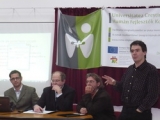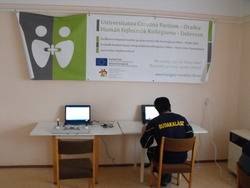| 1 | 2 | 3 | 4 | 5 | 6 | |
| 7 | 8 | 9 | 10 | 11 | 12 | 13 |
| 14 | 15 | 16 | 17 | 18 | 19 | 20 |
| 21 | 22 | 23 | 24 | 25 | 26 | 27 |
| 28 | 29 | 30 | 31 |
Home
Downloads
2014+
| 1 | 2 | 3 | 4 | 5 | 6 | |
| 7 | 8 | 9 | 10 | 11 | 12 | 13 |
| 14 | 15 | 16 | 17 | 18 | 19 | 20 |
| 21 | 22 | 23 | 24 | 25 | 26 | 27 |
| 28 | 29 | 30 | 31 |
This project aims at promoting labour market integration of Roma people in the Bihor–Hajdú-Bihar Euroregion. So far the competencies and skills of around 300 Roma persons from both sides of the border have been successfully tested.

Out of the previously implemented social and economical inclusion programmes targeted at Roma population from Romania rather few focused on improving their labor market status. Moreover these programmes, together with those launched in Hungary, were characterized by a certain lack of flexibility.
The training-employment concepts very often place the Roma population into distinct employee groups (traditional crafts, agriculture, production-line jobs, etc.) despite the fact that the employment skills in this population are extremely diverse.
This recognition was the base for the joint project entitled "Providing professional and institutional support for the integration of the Roma population in the labour market of the Bihor–Hajdú-Bihar Euroregion” implemented in close cooperation by the Christian University Partium from Oradea (Lead Partner), the Human Developers Association of Debrecen (Project Partener) and Ciorre Roma Foundation, Oradea (associated partner) The 12 months research and development project was started in December, 2009.
The general objective of the project is to provide professional and institutional support for the integration of the Roma population in the labour market of the Bihor–Hajdú-Bihar border region. The specific objectives are:
• Identifying the main factors influencing the employment opportunities of Roma
• Recommendation and elaboration of professional training programs specifically designed for Roma
• Setting up an institutional framework (counselling centres, job fairs) aimed at enhancing the occupational prospects of Roma
The target groups are the Roma population, present and potential employers, training institutions and professionals of Bihor and Hajdú-Bihar counties.
The project activities include: analysing the factors influencing Roma employment, development of training standards, preparation of programmes and setting up institutionalized employment services for Roma employees.
The specific feature of the project is that it envisions the social integration of Roma people living on the Hungarian–Romanian border into the confluent euro-regional labour market. This effort will hopefully contribute to the reduction of poverty and the facilitation of the social inclusion of one of the most marginalised ethnical-cultural groups in society.
The activities of the project are correlated; the "social diagnostic” phase is followed by a "therapeutic” intervention phase. From January to March this year employment testing we carried out using the internationally certified Vienna Test System, involving as many as three hundred potential Roma employees.
At the same time, we requested participants to fill out a complex questionnaire surveying life quality. Respondents were selected out of the active and potentially active age-groups (18–55 years old) from the settlements near Oradea, as follows: Biharkeresztes – 50 persons, Told – 50 persons, Fugyivásárhely (Osorhei) – 50 persons, Köröskisjenő (Ineu) – 50 persons, Oradea – 100 persons. The employment tests were focused on the examination of hand-coordination, attention, general intelligence, motivation to work, performance requirements. The results show that almost three quarters of the potential Roma workers can be trained; some of them have extraordinary mental skills. (The lack of a high-school diploma is a problem mainly in Romania, since this is in most cases set as a condition for employment and a pre-condition of further adult and professional education. To tackle this problem so called "second chance” education programmes were launched.) The 300 persons who have participated in this examination can have an individual personal employment description which will help them to be employed in the future.
Presently interviews and workshops are being carried out with involving the representatives of the concerned groups (employers, employment agencies, Roma leaders, experts, etc.), followed by the preparation of new training programmes and their adaptation to the existing ones based on the specific needs of our target groups. Two job fairs will be organized (Oradea and Biharkeresztes) for the Roma people seeking jobs, but an employment portal is also under preparation which will enable match-making between employers and job seekers.
The results and experience gained from the project will be summarized in a bilingual employment guide. The sustainability of the project will be assured by the institutionalisation of the already existing consultation service especially designed for Roma people.
The launch of the project was received with considerable interest by the media representatives. Duna Television and the Regional Studio of the Cluj Romanian Radio broadcasted a compilation and an interview about the employment tests, experts of the project participated in the morning programme of the Oradea local television and several articles were published in the local papers of Bihor County. In Hungary, Alföld television presented the project and its intermediary results. These publications appeared on many internet-portals, as well.
The visibility of the project is ensured by the three-language website of the project (www.roma-employment.eu), which is constantly updated.
The project is co-founded by the EU with an amount of 81 611 Euro ERDF.
The project is implemented between: 1 December 2009 – 30 November 2010.
Author of the article: Levente Székedi, Expert